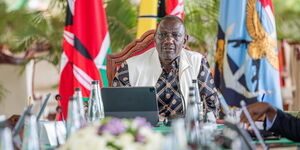Kenyan exporters of agricultural products have received a major boost after the European Union (EU) classified the country as a low-risk nation under its new anti-deforestation regulations.
The reassurance came during a high-level meeting between Agriculture Cabinet Secretary Mutahi Kagwe and EU Ambassador to Kenya, Henriette Geiger, held at Kilimo House in Nairobi.
Ambassador Geiger moved to allay fears, assuring the Cabinet Secretary that Kenya is considered low risk and will not face a stringent assessment under the new EU rules. She further indicated that the EU would continue to consult its partner nations to evaluate the real-world impact of such regulations.
This move is expected to ease the compliance burden for Kenyan exporters, particularly those dealing in tea, coffee, flowers, and other key crops, by reducing documentation requirements and fast-tracking market access.
The new status is also a win for Kenya's investment climate, as it signals adherence to sustainable environmental practices. This is likely to attract more investors into the country’s agribusiness sector, particularly those focused on green value chains and climate-smart agriculture.
Additionally, the decision strengthens Kenya’s trade relationship with the EU, which remains one of its largest export destinations. The classification could pave the way for preferential trade arrangements in future negotiations and increase the visibility of Kenyan produce in European markets.
The meeting, which brought together top officials from the Kenya Plant Health Inspectorate Service (KEPHIS) and the Agriculture and Food Authority’s Coffee Directorate, centred on strengthening agricultural trade ties and addressing challenges posed by evolving EU regulations.
CS Kagwe welcomed the EU’s recognition of Kenya’s environmental efforts, noting that the country’s tree cover is steadily increasing, bolstered by the expansion of crops such as avocado and coffee, which contribute to reforestation. However, he warned against what he termed "shifting goalposts" that could jeopardise Kenya’s competitiveness in the European market.
“If you must shift the goalpost, provide support. These regulations increase the cost of production for Kenyan farmers,” Kagwe said, referencing the recent introduction of the deforestation law shortly after Kenya had successfully implemented the False Codling Moth (FCM) Systems Approach Protocol for rose flower exports.
On the issue of FCM, the meeting heard that Kenya’s efforts to control the pest are yielding strong results. KEPHIS reported a drastic reduction in flower interceptions at EU borders, with none recorded last month and only one this month. This success follows the implementation of the Systems Approach Protocol, which has strengthened Kenya’s phytosanitary compliance and protected a vital export sector, according to the ministry.
Additionally, despite the progress, exporters have raised concerns over the current 25 per cent sampling rate for flower consignments, arguing that it is too high. KEPHIS has urged the EU to consider reducing this to between 5 and 10 per cent and called for the deployment of more inspectors to facilitate smoother export processes.
The reclassification comes at a time when Kenya’s exports to the EU are already strong, having hit Ksh450 billion in 2023. The EU remains Kenya’s largest export market, with Kenyan goods enjoying duty- and quota-free access under the EU-Kenya Economic Partnership Agreement, which came into effect on July 1, 2024.












